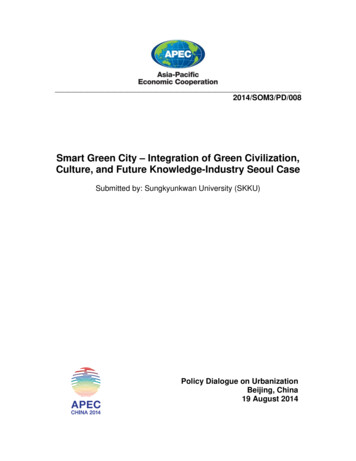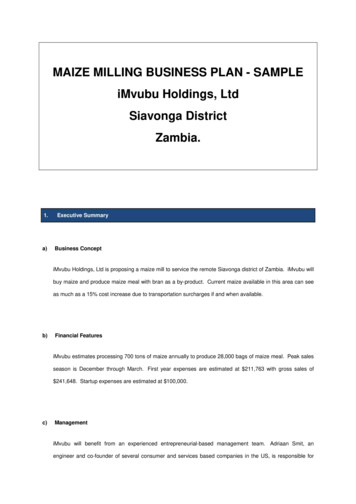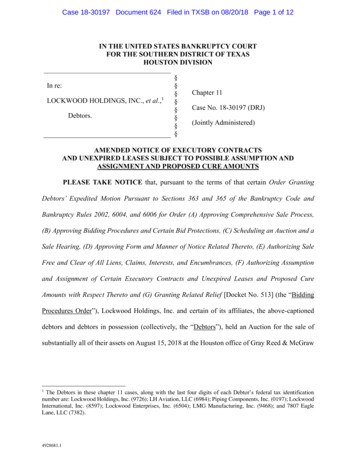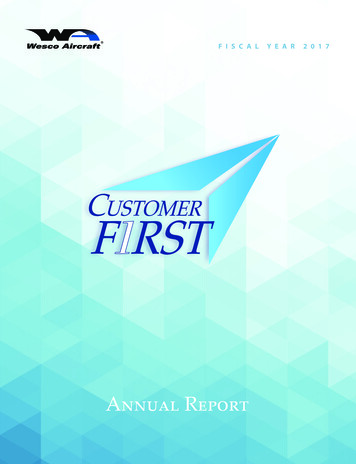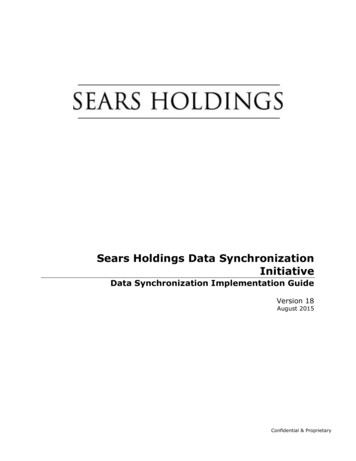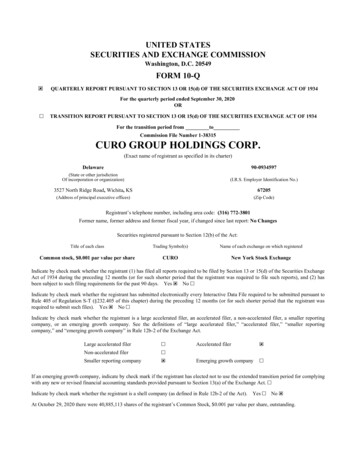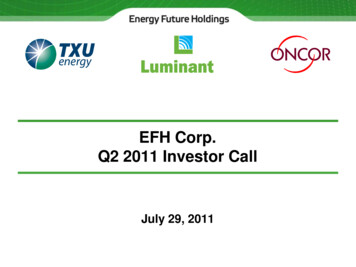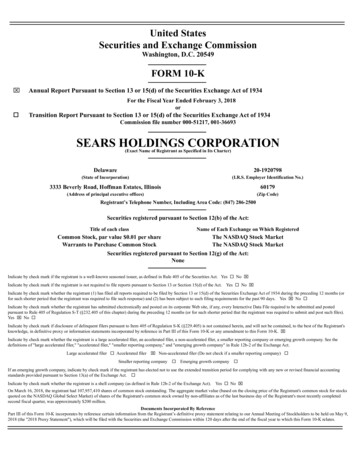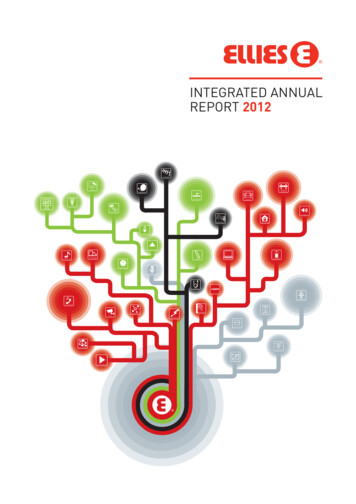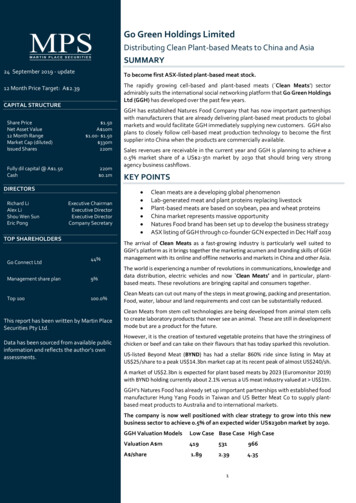
Transcription
Go Green Holdings LimitedDistributing Clean Plant-based Meats to China and AsiaSUMMARY24 September 2019 - updateTo become first ASX-listed plant-based meat stock.The rapidly growing cell-based and plant-based meats ( Clean Meats’) sectoradmirably suits the international social networking platform that Go Green HoldingsLtd (GGH) has developed over the past few years.12 Month Price Target: A 2.39CAPITAL STRUCTUREShare PriceNet Asset Value12 Month RangeMarket Cap (diluted)Issued Shares 1.50A 10m 1.00- 1.50 330m220mFully dil capital @ A 1.50Cash220m 0.1mDIRECTORSRichard LiAlex LiShou Wen SunEric PongExecutive ChairmanExecutive DirectorExecutive DirectorCompany SecretaryTOP SHAREHOLDERSGo Connect Ltd44%Management share plan9%Top 100100.0%This report has been written by Martin PlaceSecurities Pty Ltd.Data has been sourced from available publicinformation and reflects the author’s ownassessments.GGH has established Natures Food Company that has now important partnershipswith manufacturers that are already delivering plant-based meat products to globalmarkets and would facilitate GGH immediately supplying new customers. GGH alsoplans to closely follow cell-based meat production technology to become the firstsupplier into China when the products are commercially available.Sales revenues are receivable in the current year and GGH is planning to achieve a0.5% market share of a US 2-3tn market by 2030 that should bring very strongagency business cashflows.KEY POINTS Clean meats are a developing global phenomenonLab-generated meat and plant proteins replacing livestockPlant-based meats are based on soybean, pea and wheat proteinsChina market represents massive opportunityNatures Food brand has been set up to develop the business strategyASX listing of GGH through co-founder GCN expected in Dec Half 2019The arrival of Clean Meats as a fast-growing industry is particularly well suited toGGH’s platform as it brings together the marketing acumen and branding skills of GGHmanagement with its online and offline networks and markets in China and other Asia.The world is experiencing a number of revolutions in communications, knowledge anddata distribution, electric vehicles and now Clean Meats’ and in particular, plantbased meats. These revolutions are bringing capital and consumers together.Clean Meats can cut out many of the steps in meat growing, packing and presentation.Food, water, labour and land requirements and cost can be substantially reduced.Clean Meats from stem cell technologies are being developed from animal stem cellsto create laboratory products that never see an animal. These are still in developmentmode but are a product for the future.However, it is the creation of textured vegetable proteins that have the stringiness ofchicken or beef and can take on their flavours that has today sparked this revolution.US-listed Beyond Meat (BYND) has had a stellar 860% ride since listing in May atUS 25/share to a peak US 14.3bn market cap at its recent peak of almost US 240/sh.A market of US 2.3bn is expected for plant based meats by 2023 (Euromonitor 2019)with BYND holding currently about 2.1% versus a US meat industry valued at US 1tn.GGH’s Natures Food has already set up important partnerships with established foodmanufacturer Hung Yang Foods in Taiwan and US Better Meat Co to supply plantbased meat products to Australia and to international markets.The company is now well positioned with clear strategy to grow into this newbusiness sector to achieve 0.5% of an expected wider US 230bn market by 2030.GGH Valuation ModelsLow Case Base Case High CaseValuation A m419531966A /share1.892.394.351
COMPANY PROFILEGo Green HoldingsGGH founded in 2015 to marketagricultural products into China-In ProfileGo Green Holdings (GGH) was co-founded by ASX-listed GoConnect Limited (GCN)in mid-2015 as a joint company with a Hong Kong associate to seek to develop anincome stream from marketing, branding and distribution of agricultural productsand other opportunities in China and capitalising on GCN’s 20 years strong experienceand knowhow in Internet TV new media.GGH has since developed an integrated business plan with various parts locked in bypartnership agreements ready to be implemented particularly through Natures Food.GGH holds 85% of Natures FoodCompany LtdWide distribution being set up in Asiaand USAChris Pang (star of Crazy RichAsians movie) is Brand Ambassadorand a 10% shareholder of NaturesFood.Brand PartnersWell connected and experiencedAdvisory BoardGGH set up its subsidiary Natures Food Company in 2018 to leverage its strengths inmarketing, branding, media and communications and distribution relationships.GGH has brought in Chris Pang (star of Crazy Rich Asians movie) as Brand Ambassadorand a 10% shareholder.Natures Food Company specializes in the Clean Meat industry and is initially targetingdistribution of co-branded plant based food products worldwide and has relationshipseither directly or via its shareholders and partners in the US, Australia, Asia (includingGreater China, South Korea, Japan, Taiwan, and ASEAN, Sri Lanka and Indiansubcontinent), Israel, Turkey, and the Middle East.Brand Partners include Hoya (Hung Yang Foods Co Ltd- Taiwan) Australian Eatwell The Better Meat CoNatures Food has a range of experienced players on its Advisory Board to ensure it iskept abreast of developments in markets, technologies and government policies.Ivy Chia Chin Lin: Natures Friend Company Ltd Vegan market expertGareth Sullivan: Animal Stem Cell Technology advisorDr Jon Nevill: Environmental Policy AnalystPaul Shapiro: Founder CEO Better Meat CompanyKristopher Gasteratos: Founder & President Cellular Agriculture SocietyIan Nixon, FRACS Notable medical practitionerFinancial History2
Introduction to the Clean Meat and Plant-based Meat LandscapeBeyond Meat rose 860% from its IPOpriceMarket cap hit US 14bnThe recent strong share market performance of Beyond Meat where it rose 860%from an IPO raising US 241m at US 25 to a peak US 239.71 and valuing it at overUS 14bn certainly caught investors eyes and made the company one of the best IPOsin US history. It dramatically highlighted the growing global interest in vegan diets.Plant based meats in hamburgerpatties, sausages and minced meatConsumer interest is being encouraged by the opportunity of having a readilyavailable and attractive vegan food as a hamburger that looks and tastes like beef andthe related sausage and minced meat products mark strong sales around the world.Big names in distribution- Dunkin’, 7Eleven, Tim Horton etc.BYND has a modest product offering of burgers, sausages and minced products asbeef and chicken substitutes but has distribution deals with Dunkin’, 7-Eleven, Carl’sJr, Tim Horton and Hello Fresh that are resulting in rapid sales growth. Marketpenetration should only increase as these arrangements go international.Sales growth was 256% pcp for JuneHalf 2019170% expected for full 2019Impossible Foods supplies BurgerKing’s Impossible WhopperTyson Foods, Morning Star, Nestleand Unilever are here too.The expanded capital base for Beyond Meat allowed a 256% gain in sales revenues toUS 107m for the June Half 2019 and expectations of US 240m ( 170%) for all 2019and a positive bottom line. Recent additional funding will add to manufacturingcapacity its two factories in Missouri and to marketing programs.Beyond Meat is the market leader but is being chased by a second major company,yet-to be-listed Impossible Foods, which has just raised US 300m and has tied withBurger King to produce the Impossible Whopper. Major US meat processor, TysonFoods has become a major player in plant-based meats and combined meat-vegetableprotein foods as well. Other participants in this growth surge include Morning Star(Kelloggs), Nestle and Unilever where dairy substitutes are widespread.Beyond Meat product sales are made as fresh items to restaurants and foodservice(currently 50% of sales) and fresh and frozen items are distributed through retailersand also through online services.Plant based meat now and cell-basedmeats later90% less emissions99% less water93% less land46% less energyMade from vegetable proteins withoils and other nutrientsThe rapid acceptance of distribution arrangements is giving plant-based meatproducers an almost viral online growth profile.These current sales are plant-based meat products but in the longer term there shouldalso be stem cell-based meats that do not involve growing or slaughtering animals.Beyond Meat CEO Ethan Brown lists the impressive environmental advantages as 90% fewer greenhouse gas emissions, 99% less water, 93% less land, and 46% lessenergy for the production of Beyond Meat compared to regular meat’.Plant based meats are made to be GMO-free, gluten-free and cholesterol-free for anever growing consumer preference and are made from mixtures of pea proteinisolates, rice, wheat or soy protein, mung bean protein, coconut oil, and otheringredients like potato starch, apple extract, sunflower lecithin, pomegranatepowder, etc. with a range of vitamins and minerals.3
Plant-based meats are not just forvegetarian and vegansMillennials are enjoying theenvironmental benefitsPlant-based meats could reach 10% ofthe meat market by 2030.Demand for plant-based meats is arising from vegans and vegetarians but also fromenvironmentalism and concerns over animal welfare.However, market research is showing that 95% of demand is meat eaters willing toreduce meat consumption and this is being rapidly adopted by Millennials.This uptake to date strongly suggests the market is not just for vegetarians and vegansas is potentially far greater as these plant-based inputs are also combined with meats.A recent report by the investment bank Barclay’s expected global sales of alternativemeat substitutes like plant based burgers could reach an annual 140bn in a decade,gaining market share of 10 per cent of the 1.4tn world meat market’.Alternative meat products are expected to gain from the current position of less than1 per cent of global share.Global meat consumption is around 300m tonnes and is projected to grow by about2%pa to 375m tonnes by 2030.MPS projections10% of US 2.4tn is US 240bnWith the global market for meat at US 1.4tn today, that 2% growth rate givesUS 1.9tn by 2030 but a more likely growth rate would be 5% reflecting the rapidgrowth in emerging markets and the growth in more advanced processing of meatsas well as the Clean and plant-based meats to give US 2.4tn. The meat/plantcombinations would add further to the market sector. These figures have beenparalleled by a recent report by US investment bank Jefferies with US 2.7tn by 2040.WHO and Barclays data; MPS projectionsSales will be primarily the plant-based meats with many meat/plant combinedproducts being added. Cell-based cultured Clean Meats will become commercial butthis is still several years away.Impossible Foods thinks it could beUS 3tn by 2030Impossible Foods is a leader in alternative meat commercialisation and CEO PatrickBrown considers that the total meat market will be US 3tn within a decade as thesealternative meats become viable and much cheaper. Combined with plant-basedmeats and combination meat/vegetable products and cell-based cultured meats themarket could be very large indeed.The value of the two main players, the listed Beyond Meats and the Venture Capitalfunded and as yet unlisted Impossible Food, is substantial and is anticipating verysignificant long term growthCompanyBeyond MeatShares (m) Price (US ) Mkt Cap (US b) 2019 Revenues (US m)60.6Impossible Foods n.av.1478.9240n.av. 5n.avThese figures are very high compared to GGH’s market cap of US 231 million whichalready has revenues in the next 12 months and has access to 100 products with over25 years product sales history of its main supplier.The market place is likely to rapidly heat up as new players come to the market.4
The Clean Meat MarketsThe future for non-livestock meats has many issues for consideration.Demand for meat protein will continue togrowThe growth in global population is unrelenting although regionally it will be strongerin India, Africa and Sth America so demand will continue to rise.The rising middle classes will simply want more meat in whatever form.Pressures on land and water availability will limit livestock production so alternativesare being sought.Livestock protein may be archaic andhighly inefficientA case can be made that raising and slaughtering livestock is a very inefficient routeto table serving of protein.Grazing areas can be large and feed, water and labour inputs can be very high and theprocess can be affected by weather and disease.Alternative meats may be disease andchemical freeThe two routes of plant-based meats from flavoured textured vegetable proteins andthe developing cell-based animal proteins of laboratory-grown cultured flesh offersolutions to the future supply of proteins to human diets.The immediate commercialisation will need to be through the plant based meats butthe longer term will be joined by the cell-based meats.The markets for these products will be met by ground meat in whatever style.The size of the meat replacement market is already large through manufacturers likeMorning Star but Beyond Meat and Impossible Foods are the first major attempts toproduce foods that actually taste like meat.The immediate markets for beef and chicken with lamb, pork and seafood not farbehind are fast food outlets but there is widespread distribution throughsupermarkets and online.Big players here areBeyond MeatImpossible FoodsTysonHoya (GGH)The future could be through companies likeMemphis Meat and Future MeatTechnologies .The product list for the new wave here is quickly identified for Beyond Meat Impossible Foods Tyson Raised and Rooted Tyson Aidells brands Hoya (GGH’s Natures Food strategic partner)The future with cell-based meats will be through companies like Memphis Meat andFuture Meat Technologies that are well advanced in developing these processes.Beyond MeatThe Beyond Meat Burger5
Beyond Meat meat pattiesImpossible FoodsThe Impossible BurgerNow available nationwideSave the EarthBuy Impossible Burgers96% less land87% less water89% fewer GHG emissions6
The plant-based meats are ideal for anyground or minced meat as beef, pork,chicken and seafoodTyson Foods - (Raised and Rooted brands)Tyson FoodsTyson Foods Inc., Springdale, Arkansas has the Raised & Rooted brand to providegreat-tasting plant-based and blended foods for today.Raised and Rooted brandsProducts include a burger featuring a combination of 90 percent lean Angus beef andpea protein isolate. The patties provide 19 grams of protein and contain 40 percentfewer calories and 60% less saturated fat than an 80 percent lean/20 percent fat allbeef burger.Lean beef patties mixed with plantmaterialPlant-based chicken nuggetsTyson Foods – (Aidells combination range)Tyson FoodsTyson’s Aidells brand has blended sausage and meatballs to add to its chicken-basedground and formed products with inclusions, such as cheese, fruits and vegetables.This new brand places more emphasis on the plant-based extras. Many of theblended plants are the fashionable quinoa and similar.Aidells combination plant and meatproducts7
UK based Greggs Bakeriesreleased this vegan sausage rollto great acclaim and had hugepositive impact on demand for allGregg’s productsHoya Products (Hung Yang Foods Co Ltd – GGH Strategic Partner)Hoya ProductsGGH Strategic PartnerHistory of producing theseproducts for over 25 yearsHung Yang has been producing these types of products for over 25 years for marketsin Asia, Europe and North America.It manufactures over 100 products from five factories with current capacity of about600 tonnes per month. Products are patties and dumplings of many varietiesincluding seafood, chicken and beef.GGH will be assisting in branding, marketing, and distribution.Many high quality products8
Cell-based Cultured MeatsCell-based meats are underdevelopmentLab- meat takes out the steps ofraising and processing livestockSeveral companies have successfully created meats from animal stem cells but theprocess is currently slow and the product is expensive but over time these hurdlesare expected to be overcome.It takes more than 38 kg of feed to produce 1 kg of beef. Lab-grown meat requiresonly 1% of the land and 16% of the water of traditional meat.Success in this stem cellcommercialisation could reducemeat costs and also provide higher and moreconsistent quality be chemical free .and disease free The health aspects of cell cultured meats are being jointly addressed by the USDepartment of Agriculture and the Food and Drug Administration under existinglegislation to appropriately regulate cell-cultured food products derived fromlivestock and poultry.Bill Gates, Richard Branson andTyson Fords have invested hereBill Gates “How are we going tofeed the 9 billion people on thisEarth by 2050 if we keepslaughtering animals for meat?”Producing meat from stem cells.Memphis MeatsBill Gates, Richard Branson and Tyson Foods have invested in this company.It makes food by sourcing high-quality cells from animals and cultivatingthem into meat by cutting out the raising and processing of animals to bringconsumers nutritious and tasty meat.Producing meat from the cell level up ensures the highest level of quality atevery stage and keeps the benefits of conventional meat while makingproducts healthier, more nutritious and safer.This project is still developing but it has made the world’s first cell bredmeatball and the world’s first cell-based poultry.World’s first cell-based meatball.World’s first cell-based poultry9
Future Meat TechnologiesFuture Meat Technologies is creating muscle and fat from animal stem cells in itslaboratories based in Israel.10
The Global Meat MarketGlobal meat consumption isaround 300m tonnes paAnnual global meat production is around 300 million tonnes and the World HealthOrganization expects it to grow to around 376 million tonnes by 2030.The world’s livestock sector is growing strongly to meet the combination ofpopulation growth, rising incomes and urbanization.Global market is38% poultry32% red meat24% seafood5% otherThe growth is driven by population growth, rising incomes and urbanization.The total global market for processed meat is made up of poultry (38%), red meat(32%) seafood ( 24%) and others (5%) with over US 1tn sales value.Source: Statistica 2019Asia has the most people and thefastest growth11
Global per capita consumption ofmeat is over 40kg.The data shows the US has strong growth in poultry and declines in pork and beef.The global picture shows a very high proportion of seafood and relatively low numbersfor beef.Poultry growing in US but beef andpork decliningChina ranks #1 by consumptionwith 28% of the world’s meatagainst 20% of the populationBut ranks #16 on a per capitabasis China is still a major growthmarket.Source: US Dept AgricultureChina ranked 16th in the world for per capita meat consumption in 2015 with a figureabout only 50% of that of top meat eaters in the US, Australia, Argentina and Brazil.Meat consumption in China per capita increased 600% from 1990 to 2018 with furthergrowth likely and annual meat consumption growth is expected to exceed China’s GDPgrowth for quite some years and is estimated to reach 98 million tonnes by 2026.In contrast with the consumption ranking, China is the world's largest meatconsumer by total weight and its 20% share of global population consumes up to28% of the world's meat.China is therefore an excellent market to tap into.GGH has recognized this and has conceptually led the marketplace with its platformthat can provide the convergence of online and offline services to deliver consumerproducers to wholesale and retail markets to meet the expected growing demand.12
Investment ReviewGGH is well positioned within this large and
Sep 24, 2019 · from an IPO raising US 241m at US 25 to a peak US 239.71 and valuing it at over . Jr, Tim Horton and Hello Fresh that are resulting in rapid sales growth. Market . (currently 50% of sales) and fresh

